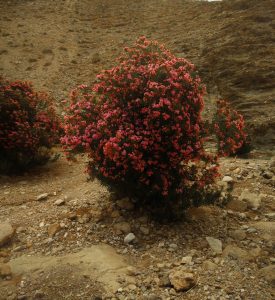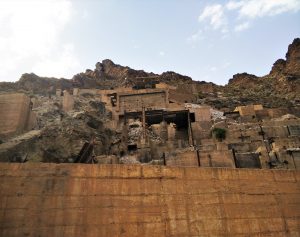
Ghost Town near Midelt
By Snigdha Nautiyal
Mines d’Ahouli, located besides the Moulouya river about an hour’s drive from the town of Midelt, was once a bustling mining town where lead, antimony and galena were mined by the French. Today it is abandoned – or so you would think! No matter how deserted a corner of Morocco you go to, you will find someone there. Aouli is no different.
 Getting to Aouli can be a bit of a challenge. The road is beautiful; brown and rocky as it runs besides the rushing Moulouya river, it contrasts well against bursts of beautiful pink bushes that line the landscape. We crossed a rickety old bridge – one iron beam crisscrossed with multiple pieces of wood, probably once built by the French.
Getting to Aouli can be a bit of a challenge. The road is beautiful; brown and rocky as it runs besides the rushing Moulouya river, it contrasts well against bursts of beautiful pink bushes that line the landscape. We crossed a rickety old bridge – one iron beam crisscrossed with multiple pieces of wood, probably once built by the French.
 When we reached the deserted ghost town, we realized that there were still some people living there. There were men grazing goats that lay lazily beside the river bed. We ran into a man with a cycle pedaling back with a bag full of ore. On enquiry, we found that he had spent all morning at the mine and would now go and sell his bag to intermediaries who would no doubt, pocket most of the profit. He makes about 200 dirham or $20 per day off this enterprise. There is no method to the madness. He and others like him, are unrecognized and are doing this on their own. There are no other occupations in the town.
When we reached the deserted ghost town, we realized that there were still some people living there. There were men grazing goats that lay lazily beside the river bed. We ran into a man with a cycle pedaling back with a bag full of ore. On enquiry, we found that he had spent all morning at the mine and would now go and sell his bag to intermediaries who would no doubt, pocket most of the profit. He makes about 200 dirham or $20 per day off this enterprise. There is no method to the madness. He and others like him, are unrecognized and are doing this on their own. There are no other occupations in the town.
There is talk of reopening the mine to companies from Saudi Arabia. Our guide for the day was a man whose father had lived and worked in the mines and died from a disease because of it. He had left the town years ago, as there was nothing left to do here. He took us to meet his friend, an old man with a large collection of crystals and sea ammonite fossils who still lives in a small house behind the mines. According to these two men, it would be a good thing if the mine reopened. It would give employment to a lot of people.
However, the reopening may simply mean another cycle of low-wage, high-risk work for the men in the village. It may mean another generation exploited and then left to fend for itself once the mines are exhausted or the price of the minerals are no longer profitable. For the big players coming in from abroad and exploiting these natural resources, the long-term sustainability of these places and the locals who live there does not matter. But we asked ourselves whether the benefits of modern mining will be distributed in much the same way as those of colonialization once were, or whether the Moroccan government will be able to negotiate a better and socially, environmentally and economically more sustainable deal for their citizens living in and around Aouli.

